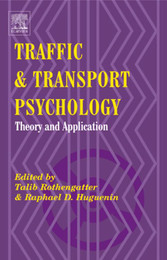Search and Find
Service
Traffic & Transport Psychology - Proceedings of the ICTTP 2000
This volume gives an overview of the trends in Traffic and Transport Psychology. It reflects the considerable development of the most important factors for driving a road vehicle, and the variety of international research approaches.
The first part contains basic approaches and integrated models as well as general theories and their implementation into Traffic and Transport Psychology.
The second part deals with the driver, especially cognition, performance, social and differential effects and impairment. Important aspects are treated, such as speed perception, reaction times, interaction, risk acceptance, aggression and gender differences. Special chapters refer to performance and fatigue.
The third part focuses on safety, driver support, selection and influencing drivers by enforcement, training and programs for the rehabilitation of traffic offenders. Classic ergonomic methods are discussed as well as modern telematic devices, or trends regarding driver-assessment.
In the last part, current developments are presented in relation to better mobility and the protection of the environment. Questions are asked, such as whether we could reduce the use of cars, how travel behaviour can be modified or to what extent the use of alternatives to motor vehicles benefits safety as well as the environment.
This work is not only important for psychologists. It should be read by all transport professionals interested in the application of psychology to traffic.
All prices incl. VAT














